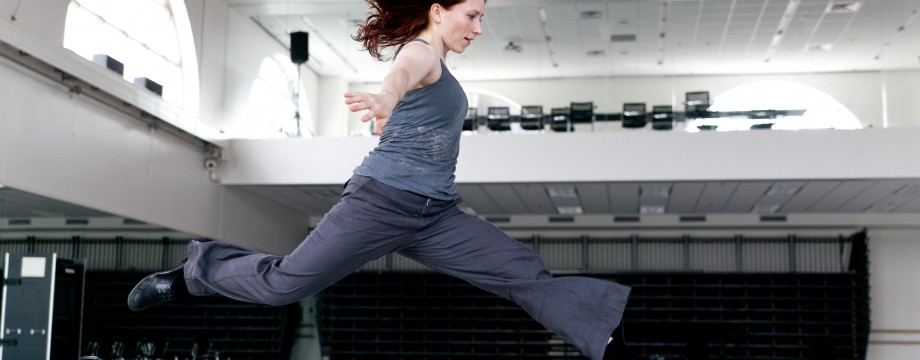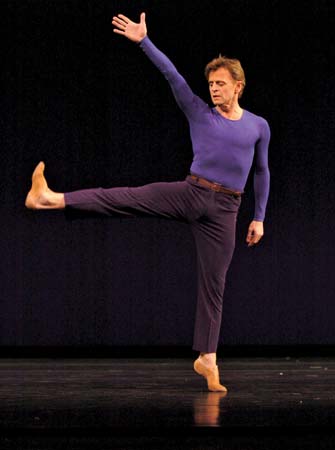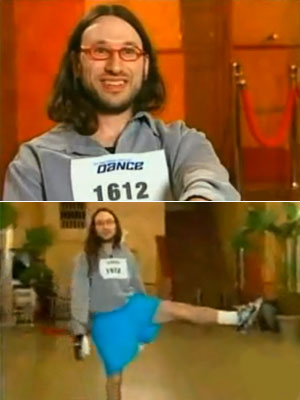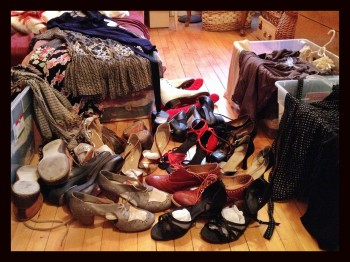Well, you’re not. Just like how a dude on OkCupid holding a guitar in his profile picture is not a Musician. A Musician is someone who gets paid to play music for other people and who has a record contract. A Dancer is someone who gets paid to dance. We’re talking Baryschnikov, Bruhn, Pavlova, Hines, Hijikata, Nijinksky, Morris, Tharp, Sparks, Robson. You don’t know who those people are? That’s because you’re not a dancer.
Jeff Joniak, (the voice of the Chicago Bears), asked me last Wednesday, why I chose dancing as my profession. I told him that it’s one of the few forms of expression out there that anyone can do without hours and hours of training. It takes years of drills on the piano to be able to express in a way that actually sounds pleasing. I remember the first moment, after about two years of plucking strings on a guitar when I strummed a few chords and it actually sounded like MUSIC. But in the moment of answering his question, I was arguing that “anyone can dance” and “anyone can express” because you just use your body and the expression is there.
But let’s face it. Most of you don’t think you can dance, and you’re right. You can’t. You have this idea of what would look cool or what makes sense to the music, but it comes out all wrong, like a child spewing paint on construction paper. The child and Jackson Pollock use the same technique, but somehow Pollock’s spew looks like art, and the child’s looks like vomit. That’s how your dancing looks and feels.
So you give up on moving by yourself because that’s awkward and people are staring, and instead you join the World of Partner Dance and you learn the steps and soon you start paying to go to parties, and paying to go to events and you ask people to dance and they say yes, and some of them even ask you to dance. You go out for burgers and shakes afterwards with your friends and they’re playing Runaround Sue and you and a girl you like jump up and swing out in the space between tables and the waitress looks annoyed when she brings a tray of cole-slaw to the table and everyone laughs, because well, we’re dancers, and that’s how we roll.
You have all the t-shirts from all the exchanges. You regularly grab a partner and show off in front of the band at the blues bar, and all the patrons stop watching the band and they watch you and they’re amazed and ask you what kind of dancing that is, and you say, “I’m a Blues Dancer.” Capital B, Capital D. You’re a Dancer and you feel Entitled to dance anywhere there’s music. But did the band pay you to distract the audience from their show? Uh no. I think you paid a $10 cover to get in the touristy blues bar. Some bands I know (the Asylum Street Spankers) actually got so sick of the entitlement of Dancers at their shows, that they prohibit dancing. Why? Because you’re jacking off all over their performance.
I think George Carlin put it best when he said, “Stop that! Stick to your faggoty polkas and waltzes, and that repulsive country line dancing shit that you do and be yourself, be proud, be white, be lame and get the fuck off the dance floor!” I laugh every time I hear that, and you do too, because you’ve seen those people.
Some of you even think you have what it takes to make it as a Dancer. You show up for auditions. You’ve got the leg warmers, and the right shoes and you’ve got your music and your moves but at the end of the day, the judge yawns and says, “next.” Guess what, still not a Dancer. Back to the studio, darling.
By now, you’re seething. You think, “who does this chick think, telling me I’m not a Dancer!” But you’re cringing inside, because you watched that last video link, and secretly you’re afraid you dance just as badly as Sex, the most hilarious auditioner of all time on So You Think You Can Dance. Maybe you’re one of my students. Or maybe you even teach dance. Studies show that one out of the three people who read my blog are dance teachers. (I always love it when Nigel scolds some poor dance instructor on SYTYCD, “You teach dance for a living? Really? You should give that money back!”) You think I’m a hypocrite. After all, I’VE never been on TV, or choreographed a routine for Britney Spears or been on the stage of a real dance hall. You’re right. I’m not really a Dancer either. My name won’t go down in the history books of famous dancers. I’m not on TV, or the movies, or on a big stage. So, I have no right.
So fuck it. Either be a Dancer, or don’t be, but quit half-assing it. Taking a dance class once a week does not a dancer make you. It’s a nice hobby, but it’s just fuckarounditis. Seriously, you can do better than that. I’m not saying you have to give up your real job and move to Soho. Just put in some effort. Put some time in, in front of a mirror. Wear some revealing clothing so you can actually see what your body looks like. Spend more than 20 minutes trying out a new move. Take some classes from a professional, someone who’s in demand. Listen to those mean judges and harsh critics, because they get paid to observe good dancing for a living and they know what they’re talking about.
If you thought of yourself as a DANCER, you’d know your history. You’d have an entire portion of your wardrobe devoted to dance. You’d cross-train and you’d find all kinds of metaphors for dance and life everywhere in the world, because you’d live and breathe dance, and then when someone asks you what you do, even if you’re an attorney, or a surgeon, or a barista or a college student, you could say, without an ounce of self-doubt in your heart, “Me? I’m a Dancer. Capital D-Dancer, bitch.”






Glad you are back to your writing. I’ve always enjoyed your writing. I usually read your pieces 3 or 4 times culling the layers and flavors. Is there a back story to this piece that you can share?
On the same day of this-your post, I reflect on a dance studio generally soliciting “dance instructors” – or better said “be a dancer instructor” – with “some Lindy or Blues” experience and promoting a career as a dance instructor. I’ve had a few too many “dance instructors” directing me to a dead end path of counterproductive technique and muscle memory in need of unlearning.
I recently had the opportunity to interact with Jenny Thomas of London who is a real dancer. It was a memorable experience to whiff in the dancer’s world from her perspective.
Hi Ruby! Interesting read, but I don’t feel like I understand what your definition of a “real dancer” is. Is a “real dancer” just someone who devotes a lot of time to it? Or is there more to it than that? What about people who do devote their time and money and energy to it but still pretty much suck? Are those people real dancers? Do you have to be good at dancing to be a real dancer? Who decides who are the “real dancers”? Your community? Your teacher? These are just some things I think about.
Calico, these are good and important questions. I think the video of Sex’s audition on SYTYCD shows the divide between definitions of the word and how those definitions can collide in specific contexts. No doubt he’s more of a Dancer than some people I work with, but he’s not up to Nigel’s standards.
I’m curious what other people have to say about this, since I’ve already laid some thoughts out there. So, I’ll hold back for now and just ask… at what point did you define yourself as a Dancer? Did your concept of yourself in that context change over time?
Hi Ruby
I see parallels in what you’re saying to the advice given to writers, particularly those who wonder if they “are a writer”, and if they should try to make a career of it: “if you’re a writer, you have the urge to write when you get up, when you go to sleep, throughout the day, yadda yadda yadda”. I think this is good advice when it comes to “should I go pro”.
On the other hand, as a researcher in the learning sciences (or am I a “Researcher”?), I want to raise the importance of learning and identity (note that this is not at all my specific domain of expertise). The points of intersection are numerous. Learning is difficult because it’s about change of identity: how do you go from being “someone who doesn’t dance” to “someone who dances”? Learning is difficult because identity is linked to self-efficacy – do you believe you can achieve something that is outside of your identity – do you as a “non dancer” believe you can learn to dance – how is that lack of belief holding you back? What ceremonies are needed to validate the experience of “having learned” (I have a colleague who jokingly says “that’s why american universities have the whole ceremonial thing with the hoods and gowns – they don’t actually learn anything so they need something to validate their change of identity”)?
Reading you made me angry (not a very big angry, but enough to spend time on composing this comment) on multiple levels. One of them is the obvious truth to what you’re saying. Another is that you’re a dance teacher and (while I know from having taken classes with you that you have both experience and skill in dance teaching, and this is your blog not your teaching platform, etc. etc. etc.) the biggest obstacle your students face is not their lack of technique or the lack of hours they’re putting into it. Their biggest obstacle is their belief that they are not Dancers.
It also made me angry because I am a dancer, thankyouverymuch. And a musician. I may never earn any money doing these things but that is irrelevant. I may not invest the amount of time into improving that I could, but that is almost irrelevant. I know I am a dancer and a musician because it is through dance and music that I express the things that I need to express. I improve my dance and music skills, not to prove that I’m a dancer, or because I’m a dancer, but because these things help me be a dancer. They eliminate the friction between what I need to express and my ability to express it. But I really don’t need much. Though I will probably always continue learning, because I also happen to enjoy learning, because I can find new ways to express things, because it helps me in my teaching efforts and building the dance community, it doesn’t actually change whether I’m a dancer or not.
Even if you’re right about what it takes to be a dancer – all that posturing and annoying waitresses just doens’t cut it, I think you have the causality wrong – it’s not once you do things that prove you’re a dancer that you will be a dancer, it’s once you believe you’re a dancer that you will do what it takes to live that identity. Though of course, if you don’t believe you’re a dancer yet, possibly behaving like a dancer will help you transition in identity.
Keep up the great writing. I’m always really excited to read your posts.
Gregory,
Good eye on the advice for writers. It was a similarly toned blog entry for writers that inspired this post. And really this is a conversation I have with myself on a regular basis. (About being both a Dancer and a Writer as well as several other identities I casually wear.) I think the important question here is one of mindset, and it’s somewhat of a chicken-and-egg scenario. An observation: I realized I was behaving like a Dance Teacher long before I adopted the the identity and therefore took special steps to validate myself as such since it seemed like a path I was already on.
Thanks for your reaction.
-Ruby
Remember when you wrote this?
“But this is against our nature.The social pressure not to dance is stronger, only because there is so much shame and fear around who we are. We are not beautiful enough, not coordinated enough and certainly not talented enough, because to ‘have rhythm’ is somehow viewed as having a talent, and to move in a coordinated manner is somehow a skill. Never mind that the heart pumps in a rhythm, and the body naturally balances itself around a shifting axis with every step. Never mind that generations of people can move their pelvises with enough coordination to procreate, and can independently control their limbs enough to operate a vehicle while texting or smoking a cigarette. Dancing is in our bodies and the way we live, but we are cut off from it by our mental constructs around what is viewed as acceptable in a social setting.
This is why dance culture lives apart from regular culture. It’s why dancers who hire bands have to explain how to play for dancers, which is different than playing for drinkers who sit. It’s why many people I meet have never heard of Blues Dance and only think of Swing as that thing you do when you “throw the girl around” like in the old movies. It’s why those of us who do dance spend precious time and money, flying into cities to attend private gatherings to be in the company of those like us, those who move freely and without fear, regardless of our talent or skill. The fact that it is so separate from regular culture pains me. I don’t want to be the crazy lady at the party who is dancing all alone. I want all the patrons to join me in the dance.”
I’m not a Dancer with a capital “D”. My goal is to be better. I’ve always known that the gap between myself and a pro was enormous and if I focused on that I’d give up entirely. So I work on improving, even if I don’t devote my life to this art. Striving because it increases my joy even as I know I’ll never make anyone stop to watch me. But now that’s only good enough for dancing in my kitchen, and stay out of your sight?
Lisa, I hear you about your reasons and you don’t need me to validate them, but I will say that they are valid and good, and absolutely a reason to dance. There was certainly no argument in my post that suggested that anyone not dance in my sight. If anything, I’d prefer more dancing, everywhere. I’m making an argument to push people a little more and take it more seriously.
It’s like meditation. Doing it for 20 minutes a week is great, and better than not doing it. Doing it for 20 minutes every day is amazing for your brain development. So, don’t let my rantings stop you from dancing ever, whether it be in your kitchen, or right in front of me. I’ve always enjoyed watching you lead. Don’t stop.
I think there is one small edit that needs to be made to this whole post before I could really agree with it myself. I will share what that edit is later. For now, I will share my beliefs…
The way this post is written, I have to agree with Gregory. To be clear, no matter how it was written, I would still agree with Gregory, but there are some small changes that would allow me to agree with both Gregory and Ruby on this topic. I will give an example in a different way to show what I mean.
Let’s say, someone says “I am a good person.” Other people can say, “No, you are not. You don’t donate to charity… or You don’t behave kindly to people you don’t know… or You don’t say yes to every dancer… or You are not Christian…” or any other number of things that for them means someone is a good or bad person. The thing is, I believe we all have different definitions of what it means to be a good or bad person and we often use those definitions to define whether or not other people are good people or not. I think this is a normal way for people to categorize but just because it is normal does not make it accurate or true. We can prove this because other people have different definitions of what it means to be a good person and as long as there are different definitions, we will always be “wrong” in someone’s eyes. So no matter what your requirements are and how strongly you believe in them, that alone doesn’t change someone else’s beliefs or requirements about what it means to be good or bad. They are your beliefs and requirements. Even if every person you have ever met agrees with your beliefs, that still doesn’t make them true or accurate, it just makes them normal.
For example, you could grow up in a Catholic town, with Catholic parents, and Catholic friends. Everyone you ever met has always agreed that you need to go to church (or confess your sins) in order to be a good person. That doesn’t mean this is true. This only means that you believe it is true, or in your experience, this is accurate. Other people will have a different view.
Another example: you could grow up in a polygamous town, with polygamous parents, and polygamous friends. Everyone you ever met has always agreed that you need to be able to love multiple people in order to be a good person. That doesn’t mean this is true. This only means that you believe it is true, or in your experience, this is accurate. Other people will have a different view.
So for someone to say “John Doe is a bad person” or “John Doe is a good person” doesn’t make that statement true, no matter how many examples of good or bad things we can show that John has done in his life. Again we can prove this because I am sure we can all think of people who we believe to be “bad people”, but those people still have friends in their life who believe they are an amazing wonderful human being, not just a good, but a great person.
So for someone to say “You are not a dancer” or “You are a dancer” doesn’t make either of those statements true or false, no matter who is saying it. And we can prove that because there is someone else out there who disagrees.
So what edit can you make to this post to make it accurate?… To me, it is very small and very simple. Add the words “I think” or “I believe” or “For me”. For example, take the statement…
“I believe that someone is a Dancer when they decide they are a Dancer.”
I really do believe that. You can argue that you believe something different, but you can’t argue that my statement is wrong or inaccurate because it is my belief. It doesn’t matter if you are Nigel, Baryschnikov, Frankie Manning, or the Holy Spirit… you still have no chance to claim that my beliefs are not my beliefs. They are. The statement is accurate.
So is this just semantics? In a way, yes, but in another way, NO! If you were to just add “I believe” to each statement above but still believed that your definition was the “right” one, that would be semantics. It is probably still more effective than writing things without “I believe” but the power and effectiveness in adding “I believe” comes from who you are when you are someone who actually recognizes the difference between your beliefs and actual “truths”.
I believe that these semantics affect the way we live and affect our effectiveness in society a lot more than we realize. For example, if I make a statement like
“You are not a dancer.”
There will be people who agree with that statement and people who disagree. Let’s look at how your statement might affect each of them separately.
There are people who will agree with your statement and they will listen to you. But does this automatically mean you are being effective or helpful? Maybe. However, I would guess that many of the people that already agree with you are probably not the people that are going to be helped the most by your comment, since they already agree. Many of them already understand this concept. You are just confirming their belief for them, not opening their mind to another possibility. By adding the words, “I believe” to your statement, you probably will not lose any of these people and they will still get the same value from your concept.
Then there are also people who will disagree with your statement and will see it as an inaccurate or false statement. So right off the bat, it is going to be much more difficult for you to get them to understand or listen to your beliefs because you are now trying to share a concept with someone but you have already lost credibility in their eyes by saying something that they believe is inaccurate. Losing credibility is not always easy to overcome and you will likely lose some of your students just due to that loss. Whereas, if you had added “I believe” to your statement, then they will not have the same problem or battle to get through before they can hear you. By adding “I believe” you haven’t said anything inaccurate in their minds, you just said something that they don’t believe. So they are now able to listen to why you believe what you believe without having to first overcome the inaccuracy of your statement. Whether or not you can get them to believe what you believe is still going to be dependent on how well you explain your belief, but at least you won’t be fighting any excess unneeded battles that distract your student from being able to understand or hear you.
Side note: This happens all the time in dance when an instructor says “this is the wrong way” and one of their students has taken a class from some other world champion dancer that told them the opposite was true. Now even though the instructor might be a more experienced dancer than their student, the student loses faith and credibility in them because they believe that the instructor is wrong or misinformed. If they had just kept to “here is a way to dance that is awesome”, they wouldn’t have to struggle with the initial concept of overcoming the barriers they will create by negating something someone else learned.
Anyway, so if you added “I believe” to this whole segment of who is and isn’t a dancer, then the statement would be accurate. So the question then becomes, “Is it a valuable statement?”
For some people, I imagine this will inspire them to work harder and so for those people it is probably valuable. For others who do meet your criteria, it will give them a sense of accomplishment and value, so it is probably valuable for them too. For some people, it might be the thing that pushes them to quit dancing. If they didn’t like dancing, then it is valuable for them. If they loved dancing, it could be detrimental for them.
Personally, I believe that you become a dancer when you (and only you) decide you are one. There is no other way that I have heard of that seems more accurate to me than this. It could be your first night out dancing when you fall in love with it and decide you are a dancer, or you might be dancing for several years and still not feel like you are a dancer. Either way, when you decide you are a dancer, this doesn’t mean you are an experienced dancer, or a professional dancer, a “good” dancer, or even an “ok” dancer in some people’s eyes. How good of a dancer you are is a different concept for a different blog post.
Ruby, thanks for providing such an interesting topic to discuss! Can’t wait to have another walk around town sharing life and dance ideas with you! Love, Andrew